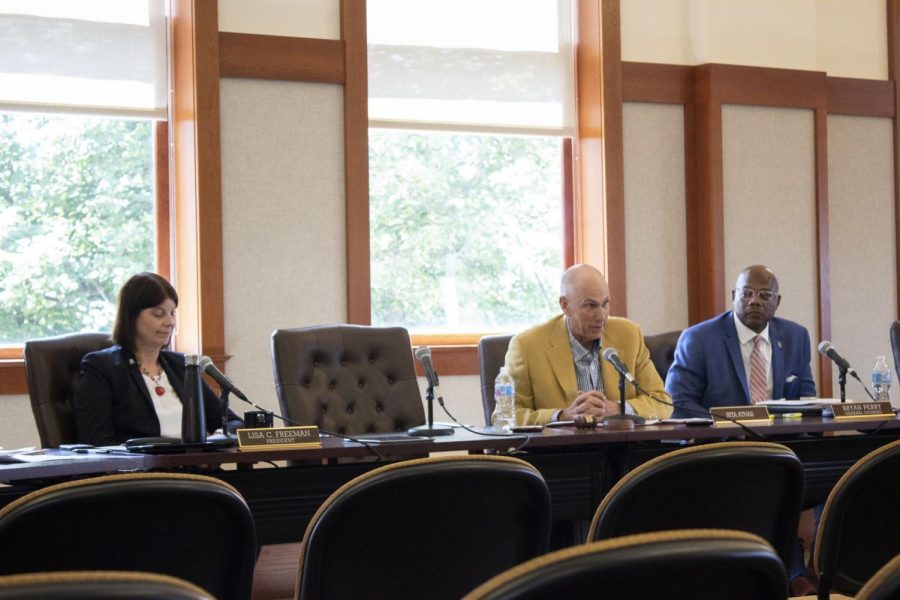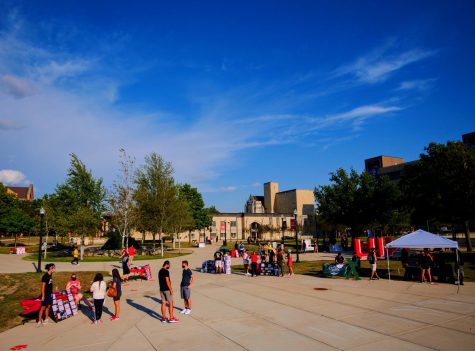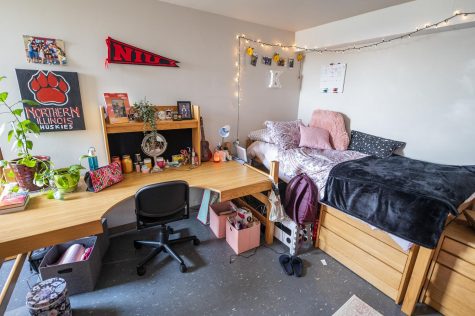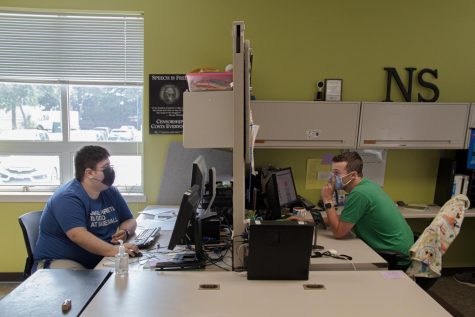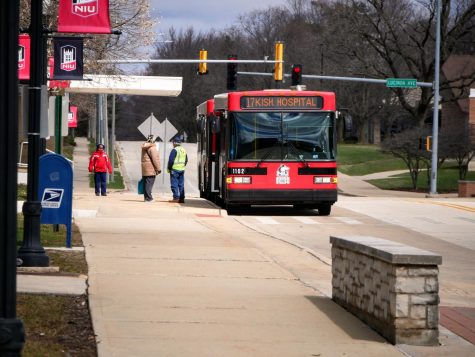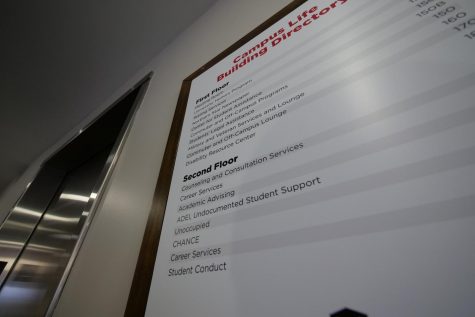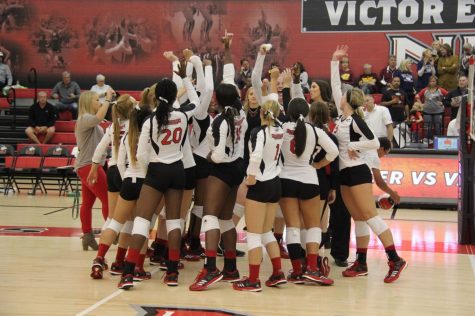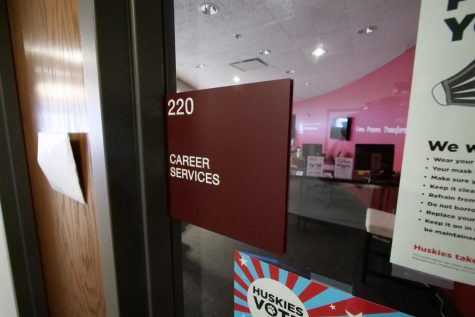Students, faculty oversee operations at NIU
At the Aug. 15, 2019, meeting, Board of Trustees Chairperson Dennis Barsema addresses former NTC students after their public comments.
August 23, 2021
DeKALB – Faculty members, students and staff are represented in various governing bodies at NIU when it comes to decision-making such as maintaining a budget for student organizations, developing policies for the university and more.
These governing bodies include University Council, the Student Government Association, Faculty Senate, Operating Staff Council and Supportive Professional Staff Council. Each of these groups reports and responds to the Board of Trustees, who operates, manages, controls and maintains the university.
Board of Trustees
The Board of Trustees at NIU is responsible for aspects such as reviewing academic programs and raising funds for the institution. The Board is generally focused on oversight and determining policies at the university, according to the Board of Trustees bylaws.
There are trustees on the Board, including one student trustee. Eric Wasowicz serves as the chairperson, Rita Athas serves as the vice chair and Montel Gayles serves as the secretary. Other members include Dennis Barsema, John Butler, Veronica Herrero, Robert Pritchard and student trustee Jacob Sommer.
Each board member also sits on several academic committees, including the executive committee, academic affairs, student affairs and personnel committee, finance, audit, compliance, facilities and operations committee, or the research and innovation, legal and legislative affairs committee.
Wasowicz said the Board of Trustees works to ensure that “we are not only providing an excellent, affordable education for our students but also doing so in a manner that is fiscally responsible and ultimately promotes the betterment of our region and state.”
“We do so by providing direction and oversight to university leadership, working to ensure that we live up to the goals and aspirations set forth in our mission, vision and values,” Wasowicz said in a statement.
Members of the Board also serve as ambassadors for the university with legislators, business leaders, alumni, donors and other important stakeholders, Wasowicz said.
The Board of Trustees holds at least one meeting each quarter in Altgeld Hall room 300.
University Council and Faculty Senate
The University Council works in accordance with the Board of Trustees in advising the president of NIU on administrative appointments of officers, setting goals and priorities for the utilization of resources, and advising the president on developing and determining basic policies for the university, said Peter Chomentowski, chair of University Council and Faculty Senate President.
The University Council also advises the president on policies affecting the quality of student life on campus.
“Students have an active role on the University Council and members are selected by the Student Government Association and the Graduate Council,” Chomentowski said. “University Council and Faculty Senate are open meetings and all NIU students can attend these proceedings.”
The University Council consists of nearly 30 members, including five student representatives.
Faculty Senate serves as the voice of faculty members and has the responsibility to establish, direct and oversee academic matters. Members also form opinions on policy decisions related to university curriculum, student admission and more keeping in mind how it’ll affect faculty members, Chomentowski said.
There are over 60 voting Faculty Senate members, including 11 student representatives.
The University Council meets Wednesdays every month at 3 p.m. The Faculty Senate also meets on a different Wednesday of each month at 3 p.m.
Shared governance
President of Faculty Senate Kendall Thu worked with Cathy Doederlein, member of Supportive Professional Staff Council, Jeffry Royce, vice president of Operating Staff Council and Ian Pearson, former Speaker of the Senate for SGA, to develop a new structure of shared governance in 2019, according to NIU Today.
Thu and the aforementioned names, along with Richard Siegesmund, member of University Council and Faculty Senate, and Pat Erickson, administrative assistant for the University Council, developed a proposal with three primary goals: empower the Faculty Senate to oversee matters of academic policy, reconfigure University Council to provide more equitable representation and reduce the number of committees, according to NIU Today.
These changes to the governance structure created shared responsibility and cooperative action among the governing bodies at NIU, NIU President Lisa Freeman said to NIU Today.
“I support the new structure, and I am proud of the way that the change was considered and achieved. Our willingness to engage around these issues is proof that we live our Huskie values – that we employ inclusive decision-making processes and act in a manner that is transparent and accountable to stakeholders.”
Under the new structure, the University Council has a broader representation from across campus, bringing five students, five members of the Operating Staff Council and four members of the Supportive Professional Staff Council onto the table, according to NIU Today. Also included for the first time are two instructor seats and a clinical faculty seat. The remaining seats are filled by the university president, the chief financial officer, the provost and a representative selected from the deans of the colleges. The body will be chaired by the president of the Faculty Senate.
The Faculty Senate, which used to be reserved almost exclusively for tenured or tenure-track faculty, now has 70 voting members and is comprised of 44 tenured or tenure-track faculty, 11 students, two representatives from the SPS Council and two from the Operating Staff Council, 10 instructors and one clinical faculty.
The broader representation allows more voices to be heard, Thu said to NIU Today.
“Instructors teach about 25% of our classes, so they deserve a voice on the Faculty Senate and University Council,” Thu said.
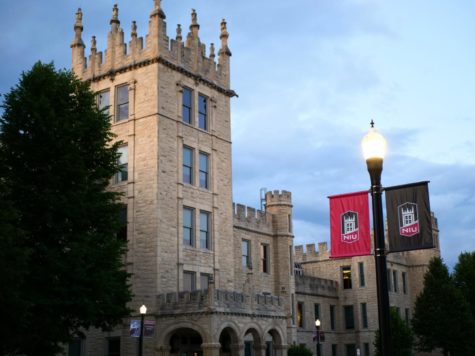
The changes should also allow the university to make decisions more quickly, said Thu to NIU Today. For instance, the adoption of test-blind admissions policies likely could have been accomplished two or three months sooner under the new structure.
Student Government Association
The Student Government Association is comprised of three branches: the legislative, executive and judicial. SGA protects the rights of the individual students and the student body as a whole by providing for the proper conduct of business related to student interest, according to their bylaws.
SGA recognizes student organizations and then can grant them funding based on SGA’s overall $1.1 million budget. Supplemental and executive allocations receive 8%, or $90,000 total, of that funding. Executive allocations, $36,000, are funds used to serve larger portions of campus, rather than a singular student organization. Supplemental funding, $54,000, is funding that any student organization can apply for through Huskie Link.
The SGA is completely made of students. SGA President Devlin Collins and Speaker of the Senate Dallas Douglass serve as the two leaders of the association. James Holmes serves as the vice president, Sommer serves as the student trustee, Ciara Myhre serves as treasurer.
The broad message of SGA is that it’s an organization that serves as a link between the students and the administration, Collins said.
“If you have a concern, you know, something’s bothering you on campus… you guys have that ability to come and talk to us (SGA members),” Collins said. “At the end of the day, you guys shouldn’t look at us as superior or an administrative figure. We are your peers, your classmates, your dormmates…Regardless of what the issue is on campus, we can fix it together.”
Any student can apply to be part of SGA. Undergraduates must have a 2.5 minimum GPA or be in their first semester at NIU. Candidates must also read and abide by SGA’s bylaws if they are to apply for any position. There are also required forms and a certain number of student signatures to receive in order to be eligible to run in the elections.
The SGA meets at 5 p.m. every Sunday and will offer a virtual form of meeting as well.



